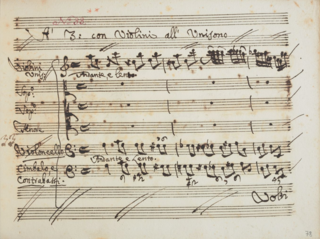Orfeo ed Euridice is an opera composed by Christoph Willibald Gluck, based on the myth of Orpheus and set to a libretto by Ranieri de' Calzabigi. It belongs to the genre of the azione teatrale, meaning an opera on a mythological subject with choruses and dancing. The piece was first performed at the Burgtheater in Vienna on 5 October 1762, in the presence of Empress Maria Theresa. Orfeo ed Euridice is the first of Gluck's "reform" operas, in which he attempted to replace the abstruse plots and overly complex music of opera seria with a "noble simplicity" in both the music and the drama.

French opera is one of Europe's most important operatic traditions, containing works by composers of the stature of Rameau, Berlioz, Gounod, Bizet, Massenet, Debussy, Ravel, Poulenc and Messiaen. Many foreign-born composers have played a part in the French tradition as well, including Lully, Gluck, Salieri, Cherubini, Spontini, Meyerbeer, Rossini, Donizetti, Verdi and Offenbach.
Caterina Gabrielli, born Caterina Fatta, was an Italian coloratura singer. She was the most important soprano of her age. A woman of great personal charm and dynamism, Charles Burney referred to her as "the most intelligent and best-bred virtuosa" that he had ever encountered. The excellence of her vocal artistry is reflected in the fact that she was able to secure long-term engagements in three of the most prestigious operatic centers in her day outside of Italy.
Andreas Karasiak is a German classical tenor in opera and concert.
Fortunato Chelleri was a Baroque Kapellmeister and composer.
Jean-Baptiste Lemoyne or Moyne was a French composer, chiefly of operas.
La danza is an opera by the composer Christoph Willibald Gluck. The title page describes it as a componimento drammatico pastorale in one act. It was first performed at Laxenburg near Vienna on 5 May 1755.
La Semiramide riconosciuta is an opera by the composer Christoph Willibald Gluck. It takes the form of a dramma per musica in three acts. The Italian-language libretto is by Pietro Metastasio. The opera premiered on 14 May 1748 at the Burgtheater in Vienna.
Ipermestra (Hypermnestra) is an opera by the composer Christoph Willibald Gluck. It takes the form of an opera seria in three acts. The Italian-language libretto is by Pietro Metastasio. The opera premiered on 21 November 1744 at the Teatro San Giovanni Grisostomo in Venice. Ipermestra is the first of Gluck's operas to survive complete.
Cythère assiégée is an opera by the composer Christoph Willibald Gluck. The French-language libretto is by Charles-Simon Favart. The first version of this opera premiered in spring 1759 at the Burgtheater, Vienna in the form of a one-act opéra comique. A completely revised version turned it into a three-act opéra-ballet which appeared at the Paris Opéra on 1 August 1775. Gluck resorted to his eponymous opera comique for the Parisian Cythère assiégée (1775) and transformed it into an opera ballet. He added recitative sections to Favarts's textual basis, re-designed sections and added his own compositions, some of them changing. His compositional works had progressed so far to the beginning of March 1775 that Gluck was able to leave a copy of the score on his departure from Paris; but neither could he supervise the rehearsal work nor be present at the premiere on 1 August 1775 or in the other 21 performances. Due to these circumstances, three versions of the work can be distinguished: the original, the listed and the printed.

Il Parnaso confuso is an opera by the composer Christoph Willibald Gluck. It takes the form of an azione teatrale in one act. The Italian-language libretto is by Pietro Metastasio. The opera premiered on 24 January 1765 at Schönbrunn Palace in Vienna. All the members of the cast were archduchesses of the Habsburg family and the work was conducted by the future Emperor Leopold II from the harpsichord.
Tetide (Thetis) is an opera by the composer Christoph Willibald Gluck. It takes the form of a serenata in two parts. The Italian-language libretto is by Giovanni Ambrogio Migliavacca. The opera premiered on 10 October 1760 at the Hofburg Palace, Vienna.
L'ivrogne corrigé is an opera by the composer Christoph Willibald Gluck. It takes the form of an opéra comique in two acts. The French-language libretto is by Louis Anseaume and Lourdet de Sarterre. The opera premiered in April 1760 at the Burgtheater in Vienna.
La corona is an opera by the composer Christoph Willibald Gluck. It takes the form of an azione teatrale in one act. The Italian-language libretto is by Pietro Metastasio. The opera was intended to celebrate the name day of Emperor Francis I on 4 October 1765 but the emperor died in August and it remained unperformed until the 20th century.
Antigono is a three act opera seria composed by Christoph Willibald Gluck. It premiered February 9, 1756, at the Teatro di Torre Argentina in Rome, Italy. The Italian libretto was written by Pietro Metastasio, who was considered to be the most important opera seria librettist. Antigono was the only opera that Gluck ever premiered in Rome. This allowed him to reuse several arias and an entire introduction from some of his other operas, L’innocenza Giustificata, L’cinesi, and La Danza.
Il re pastore is an opera by the composer Christoph Willibald Gluck. It takes the form of a dramma per musica in three acts. The Italian-language libretto is by Pietro Metastasio. The opera premiered on 8 December 1756 at the Burgtheater, Vienna.

Carlo re d'Allemagna is a three-act dramma per musica by Italian composer Alessandro Scarlatti to a libretto by Giuseppe Papis, after Francesco Silvani, premiered at the Teatro San Bartolomeo of Naples on 26 or 30 January 1716. This is the composer's 79th opera out of 114 composed.
This page is based on this
Wikipedia article Text is available under the
CC BY-SA 4.0 license; additional terms may apply.
Images, videos and audio are available under their respective licenses.


